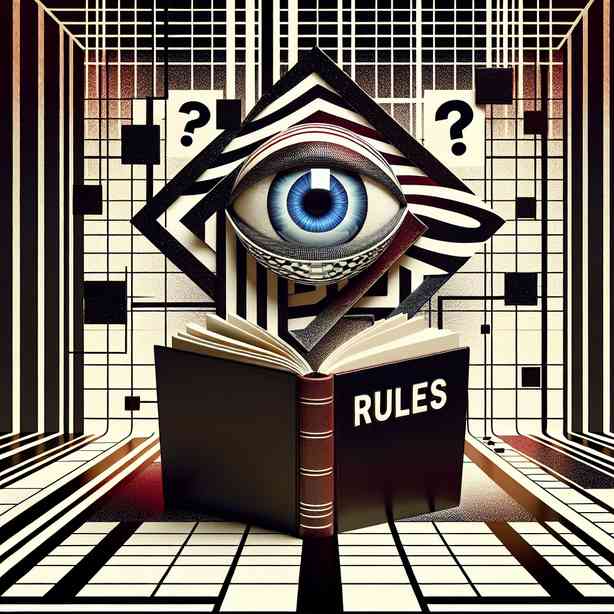
Misreading the rules of a game, a contract, or even social norms can lead to unexpected and sometimes humorous consequences. In this extensive exploration, we will delve into various scenarios where misinterpretations have occurred, how they impact individuals and groups, and what lessons can be drawn from these experiences. We will also touch upon the importance of clarity, communication, and critical thinking in avoiding such misunderstandings.
Let’s begin by reflecting on some common scenarios. One classic example is within gaming. Imagine a group of friends excitedly gathering for a board game night. They pull out a new game, enthusiastically reading through the rules. However, due to a moment of haste or lack of attention, one player misreads a critical rule about how to score points. As the game progresses, the player continues to play by their incorrect interpretation, leading to a skewed final score. At the end of the game, when the actual rules come to light, the cheerful atmosphere could quickly shift to confusion and frustration. This incident underlines the importance of attentiveness in rule interpretation but also highlights how easily misunderstandings can slip through when communication is not clear.
In a professional setting, misreading rules can lead to much more serious outcomes. Consider a scenario where an employee misunderstands the terms of a contract due to vague language or assumptions about what was said in a meeting. This misinterpretation could lead to the signing of a contract that commits the employee or their company to obligations they were not prepared for. For instance, a freelancer misinterpreting payment terms may end up completing several hours of work only to find that the suggested rate was not what they had thought. Such discrepancies not only cause financial repercussions but can also damage professional relationships and trust.
Another area where misreading rules is often experienced is in social situations. Social norms, much like formal rules, govern behavior within a group. An individual may not grasp the unspoken rules during a formal event, leading them to inadvertently offend hosts or other guests. For instance, consider someone who is invited to a cultural celebration without fully understanding the unwritten customs of that community. Their actions, based on a misunderstanding of social expectations, could lead to unintended awkwardness or even exclusion from future gatherings. This highlights how crucial it is to engage in continuous learning and adaptability when interacting with diverse groups.
Moving away from personal experiences, we can examine broader implications that arise from systemic miscommunications. In legal frameworks, for instance, legislative language can often be complex and convoluted. Individuals who misinterpret a law may unwittingly violate it, facing legal repercussions that might have been avoided had the rules been more clearly articulated. This complexity is not limited to legal matters but permeates many areas of society, where individuals must navigate intricate rules and guidelines that govern behavior.
To mitigate the risks associated with misreading the rules, fostering environments that encourage open communication is vital. Companies can hold orientation sessions where employees can ask questions about contracts and policies, ensuring everyone is on the same page. Similarly, game developers can provide clearer instructions through visual aids or tutorial modes, thereby reducing the chance of misinterpretation. In social contexts, creating spaces for discussion and learning can help individuals better understand diverse cultural practices and expectations.
Education also plays a critical role in enhancing rule interpretation skills. People should be encouraged to think critically about the information they receive, whether in written form or through interpersonal communication. Active listening and engaged questioning can significantly reduce misunderstandings. Empathy, understanding, and taking the time to clarify uncertainties are essential tools for minimizing misreadings.
Moreover, the ability to reflect on past experiences enables individuals to learn from their mistakes. Think back to the board game mentioned earlier. The initial misinterpretation may have resulted in a disrupted evening; however, the experience could be transformed into a teaching moment for everyone involved. Future games can be approached with a newfound diligence in reading rules and ensuring everyone fully understands the flow of the game.
In the world of technology and gaming, the pressure to keep up with fast-paced changes often leads to new rules being introduced frequently. Players who fail to keep abreast of these updates may find themselves at a disadvantage or misinterpreting strategies central to gameplay. Continuous education and updates in clear language can empower players to navigate these shifts seamlessly, reducing the chances of misreading the rules.
For casual gamers or new employees, seeking help to clarify confusing aspects instead of assuming can truly be beneficial. Engaging with more experienced friends or colleagues can provide clarity and foster a collaborative spirit, leading to fulfilling interactions and enhanced performances.
In conclusion, misreading the rules can happen to anyone at any time, whether in playful scenarios, professional engagements, or social interactions. The consequences can vary in severity, but the underlying theme remains consistent: good communication and clarity are vital. Ensuring that rules – both formal and informal – are understood can significantly enhance relationships and experiences in any context. By embracing a culture of questioning, learning, and growth, we can minimize the effect of misunderstandings and promote a more harmonious coexistence in all aspects of life.
The key takeaway is that we are all human, and mistakes will inevitably occur. The crucial element lies in our ability to learn from each experience, cultivate a mindset of understanding, and implement clearer communication strategies. Such practices not only enhance our own paths but also strengthen the communities and environments we engage with, leading to a more informed and cohesive society.


